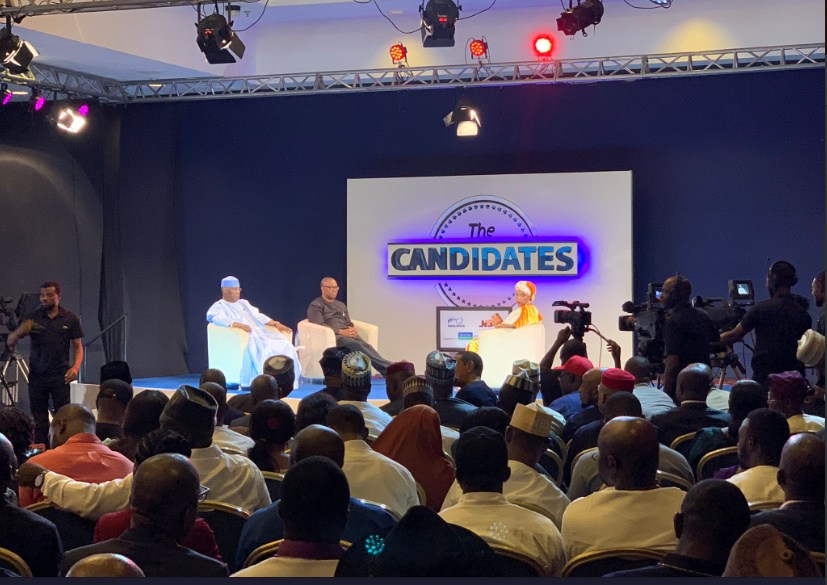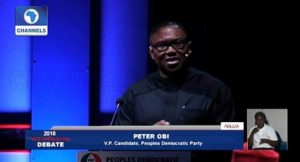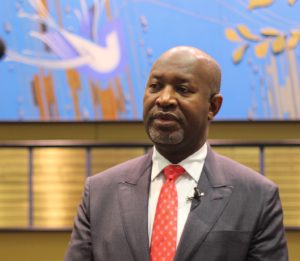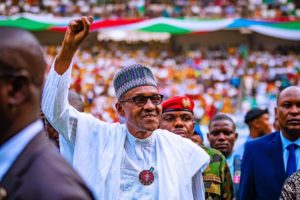A good number of Nigerians have been glued to a series of televised discussions which have held between broadcast journalist, Kadaria Ahmed and the leading presidential candidates alongside their running mates. For those who have not been in the loop, the show, called “The Candidates” might have come to their attention in the previous week after the final episode featuring Atiku Abubakar and his running mate Peter Obi, aired.
The general consensus, it seems, was that Ahmed was more probing during her session with the Peoples Democratic Party’s (PDP) candidates than she had been with other presidential and vice presidential candidates who were on the show. While that feedback might largely be subjective and thus a matter of opinion, it is perhaps more worthwhile to dig into the objective aspects of the two-hour conversation, like how factual, or otherwise, some of the claims that both candidates made are.
Claim One: PDP left office with Nigeria’s GDP Growth Rate at 6% – FALSE
We begin with the claim that in 2015 when the PDP handed over to the ruling All Progressives Congress (APC), the nation’s GDP growth rate was at 6%. According to Obi, that figure is now down to about 2%. However, a quick look at the data will show you that Nigeria’s GDP growth rate was 6.31% in 2014, a figure which reduced to 2.65% in 2015, the same year the PDP handed over to APC. The data here renders this claim false.
Claim Two: Insecurity was restricted to the Northeast under PDP – FALSE
Atiku claimed that insecurity was restricted to the Northeast when PDP was in power. This claim needs not to be probed as can be refuted almost immediately. The Federal Capital Territory (FCT) had suffered several terrorist attacks under the PDP Goodluck Jonathan administration. There were several attacks in 2010 including one at a military barracks and in 2011, there were at least two bombings, one at the United Nations and another at the headquarters of the Nigerian Police Force. Additionally, there was the attack on THISDAY office in Abuja in 2012, which was not the only attack that year, and finally one at Wuse 2 in 2014. This is a non-exhaustive list of all the attacks witnessed outside of the Northeast, there was an incident in Kano, and other places within Nigeria all before APC took over power in 2015. These incidents listed and others not mentioned here render Atiku’s claim that insecurity was restricted to the Northeast false.
Claim Three: Buhari’s administration has not invested in the power sector – FALSE
On the other hand, Obi made a claim that the current government had not invested in the power sector and what that what is currently effective in that sector was a result of PDP’s investment. However, it is known that through the Energising Economies Initiative (EEI), the current administration has sought to provide stable electricity to three major markets across some of the nations economic centers, in Kano, Abia, and Lagos states. This initiative is currently paying off, at least in Lagos State. Additionally, in December 2018, the federal government secured a loan of $200 million from the African Development Bank (AfDB) to fund electrification projects in the country. The spending on these projects may not have kicked off yet, however, it still not factual to say that this administration has not spent ‘a kobo’ on the power sector, thus this claim is also largely false.
What’s True?
In order not to give the impression that the PDP candidates only spewed a litany of false statements – they in fact did not – here are some facts that both candidates got right:
Claim Four: Agriculture is the largest employer in Nigeria – TRUE
While addressing the state of the economy, Atiku claimed that the agricultural sector employs the the largest number of people in Nigeria. A 2016 report by the World Bank in collaboration with the National Bureau of Statistics (NBS), supports this claim.
Claim Five: 21 Million Nigerians are currently unemployed – TRUE
Still on the topic of employment, Atiku claimed that about 21 million Nigerians are currently unemployed. This claim is backed by a report from the NBS which was released in December 2018. The report asserts that Nigeria’s unemployment rate increased from 18.8 percent in the third quarter of 2017 to 23.1 percent in the third quarter of 2018. According to the report, the total number unemployed people, those who did nothing at all or worked too few hours (under 20 hours a week), increased from 17.6 million in Q4 2017 to 20.9 million in Q3 2018.
While Atiku and his running mate might have botched some facts during the interview, it is also clear that the team did get some facts right. Still, in order for the voter to make an informed decision, it is perhaps best to compare performance of both candidates to those they are up against.




